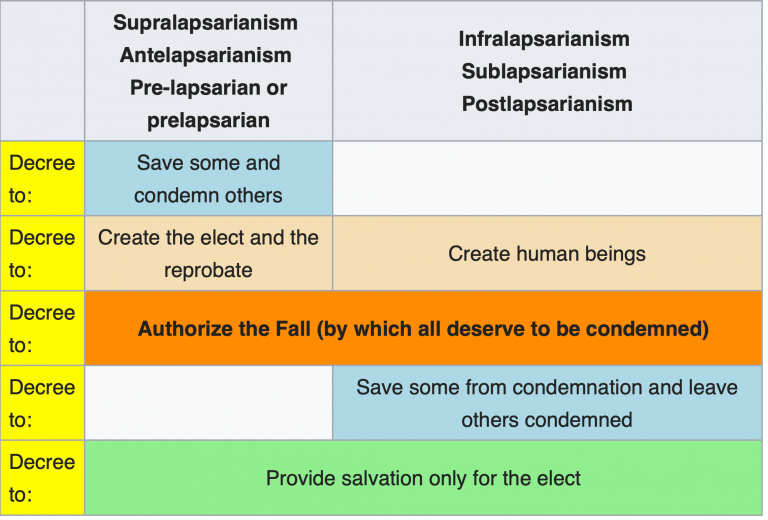Question: How sure are the Calvinists that they are unconditionally elected if no one shared the gospel to them ? While there are exceptional circumstances in which we hear testimonies of people being "saved" without any direct human involvement in sharing the gospel, God invariably employs means to draw the elect to the saving knowledge of our Lord Jesus Christ. True adherents of Calvinism would never assert that God bypasses such means for imparting the knowledge of the Gospel. If any so-called Calvinists suggest otherwise, they likely do not adhere to Calvinist doctrine or the broader beliefs of the Reformation movement on this matter. This principle is not only evident in Scripture but also explicitly outlined in the Canons of the Synod of Dort, the standard against which all claims about Calvinist teachings should be measured.The Third and Fourth Main Points of Doctrine of the Canons clearly state that Calvinists believe God uses means: “Article 17: God’s Use of Means … [Read more...]
Faith, Works, and Salvation: A short Comparative Analysis of Calvin & Arminius’ soteriological perspectives
Question: Explain the relationship between Faith and Works in justification and salvation. Compare the positions of two different theologians: John Calvin and Jacobus Arminius. There is arguably no better demonstration of the relationship between faith and works in justification and salvation than through the soteriological perspectives of John Calvin and Jacobus Arminius. John Calvin, a pivotal leader of the Reformation, and Jacobus Arminius, who studied under Calvin’s successor, Theodore Beza, represent two distinct views within Christian theology. Calvin’s soteriological doctrines, alongside those of similar Reformation thinkers, refined what is now known as "Reformed Soteriology," or more commonly, "Calvinism." In contrast, Arminius’s teachings are encapsulated within "Arminianism." As a side note, the standard of Calvinist doctrine is established by the Canons of the Synod of Dort (1618 to 1619) and various Confessions of Faith that clearly articulate … [Read more...]
A Critique of Brian Abasciano’s Corporate Election Theory
Do you agree with Brian Abasciano's corporate election theory? Why or why not? With regards to corporate election, well of course there is such a thing as corporate election (church, nation) and yes, definitely there is individual election. Even Dr. Abasciano acknowledges this as you quoted above. However I do not subscribe to Dr. Abasciano’s view because for the following reasons:1.) Dr. Abasciano engages in word play, argues on semantics and argues fallaciously – No matter how he states it either way, the group and the individual are inseparable. There is no group without the individual, no “ekklesia” without the “called out ones.” His insistence on somehow drawing a fine line between corporate election and individual election borders on committing the fallacy of equivocation. Trying to make a distinction when there should be none and then saying that both views are logically coherent, borders on the fallacy of circular reasoning. Of course, it is logically coherent because … [Read more...]
Understanding the Differences Among Calvinists: 3-Point, 4-Point, 5-Point, and Hyper-Calvinism
Well, there are some points in Calvinism that some people who label themselves "Calvinist" don't accept. However, for me, one can't consider himself a Calvinist if one does not accept the five points. The five points work seamlessly and are logically flawless together and supported by Scriptures. Further, they have a basis in Church history as they are the ones laid down by the Synod of Dort in response to Arminianism. (A side note: The most famous five-point Calvinist among independent Baptists was probably Charles Spurgeon.) You can't take one point away and still call it Calvinism. It's the whole package. You can't call yourself a Calvinist if you don't accept the five points. But that's just me; I can't impose labels on people if they insist on calling themselves a Calvinist if they only accept three or four points. But if we are to be technical about it...Most Calvinists do not consider somebody to be a Calvinist if he/she only adheres to three points, and there are a lot of … [Read more...]
My take on Infralapsarianism, Sublapsarianism, or Supralapsarianism
Among the theological topics I am interested in, soteriological issues pique my interest. As a theologian who holds to Calvinistic soteriology, I get to be asked a lot of questions on Calvinism. In this post we will tackle a somewhat technical question related to Calvinism, Infralapsarianism, Sublapsarianism, or Supralapsarianism. My response is stated below after the question. Question: First off, I want to affirm that I believe in God's Sovereignty. I have no problem with that. And yes, God could save everyone and yes, he's not oblige to. But you and I know that Universalism is not taught in the Bible. When you said he chose to save some, when did that chosing occur? Before or after the Fall? Which sysretem do you follow? Infralapsarianism, Sublapsarianism, or Supralapsarianism? When you said He "leave others to the consequences of their sin," you mean damned others to go to Hell even before they were born, right? Let me address the issue you brought up in your second to … [Read more...]





